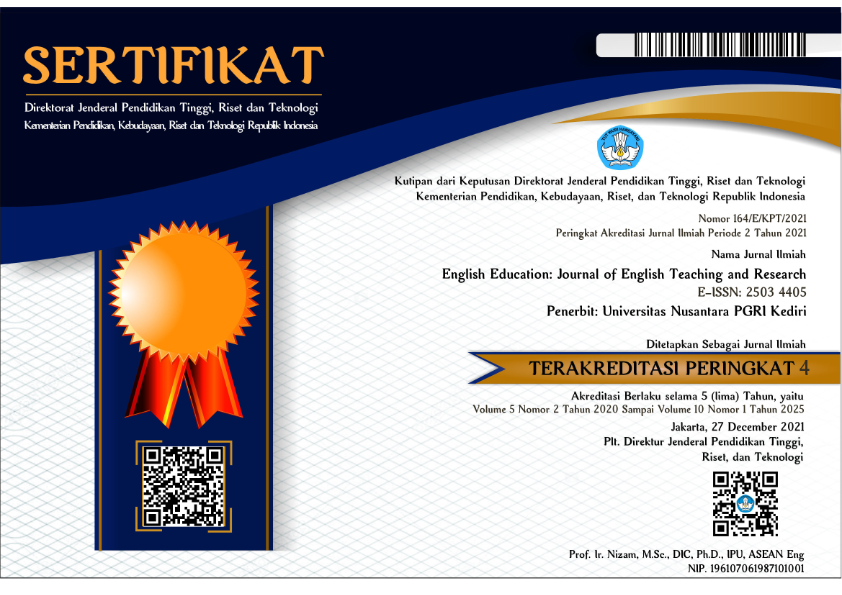The Impact of Educandy Word Search Game on Enhancing Students’ Vocabulary Mastery
A Pre-Experimental Study in Eighth Grade at SMPN 5 Pontianak
DOI:
https://doi.org/10.29407/jetar.v9i1.20552Keywords:
Educandy, Vocabulary Mastery, Word Search Game, Educandy, Word Search Game, Vocabulary MasteryAbstract
This study has objective to ascertain the effect of the word search game Educandy on students’ vocabulary mastery. This research utilized a pre-experimental design with three treatments as its methods. The research sample encompassed 31 students of VIII G at SMPN 5 Pontianak during the academic year of 2023/2024. The researcher used a test as an instrument and a measurement technique as a data collection method to complete this research. The results indicated that using the word search game Educandy enhanced students’ vocabulary mastery of learning vocabulary. According to the Mean score of the pre-test and post-test, alongside the t-test analysis, the research outcomes showed an enhancement in students’ advancement. The mean score obtained during the pre-test was 70.32, whereas the mean score during the post-test was 88.14. The calculated t-test value was 10,36, higher than the t-table value of 1.697 at a significance level of 0.05 and degree of freedom of 30. Moreover, the effect size was 1.761, which corresponds to a strong effect size with a range of effect size > 0.5. In brief, the results showed that using the word search game Educandy enhanced students’ vocabulary mastery.
Downloads
References
Bhandari, P. (2022). Population vs sample: Definition, differences & examples. Retrieved January 10, 2023, from https://www.scribbr.com/methodology/population-vs-sample/
Cohen, L., Manion, L., & Morrison, K. (2007). Research method in education sixth edition. United States of America: Routledge Publication.
Creswell, J. W. (2009). Research design. California: Sage Publication, Inc.
Gupta, N. (2022). Research methodology. India: Bluerose Publisher.
Nurhalimah. (2020). Improving students’ vocabulary mastery through word search puzzle media at the seventh grade of SMPN 2 Palopo. Department of English Education: Institut Agama Islam Negeri Palopo.
Purnami, N. L. S. W. (2022). Fun activities to teach vocabulary for young learners: A library research. Journal of English Teaching and Learning, 9(1), 19-25. https://doi.org/10.30736/ej.v9i1.609
Rahmani, E. F. (2020). The benefits of gamification in the English learning context. IJEE (Indonesian Journal of English Education), 7(1), 32-47. doi:10.15408/ijee.v7i1.17054
Sari, S. N., & Aminatun. D. (2021). Students’ perception on the use of English movies to improve vocabulary mastery. Journal of English Language Teaching and Learning, 2(1), 16-22.
Thomas, L. (2022). How to teach vocabulary. Harlow: Pearson Education Limited.
Umasugi, S., Hanapi, Bugis. R., & Handayani, N. (2018). The scramble game in improving students’ vocabulary at the seventh grade of MTS LKMD Sawa. Jurnal Retemena, 3(2), 1-10.
Usmayani. (2020). The use of word square game to improve students’ vocabulary mastery at the second year of SMPN 4 Model Parepare. Department of English Education: Institut Agama Islam Negeri Parepare.
Wu, T. T., & Huang, Y. M. (2017). A mobile game-based English vocabulary practice system based on portfolio analysis. Journal of Educational Technology & Society, 20(2), 265-277.
Downloads
Published
Issue
Section
License
Copyright (c) 2024 Novia Ramadhanti, Eni Rosnija, Eka Fajar Rahmani

This work is licensed under a Creative Commons Attribution-ShareAlike 4.0 International License.
Authors who publish with this journal agree to the following terms:
- Copyright on any article is retained by the author(s).
- The author grants the journal, the right of first publication with the work simultaneously licensed under a Creative Commons Attribution License that allows others to share the work with an acknowledgment of the work’s authorship and initial publication in this journal.
- Authors are able to enter into separate, additional contractual arrangements for the non-exclusive distribution of the journal’s published version of the work (e.g., post it to an institutional repository or publish it in a book), with an acknowledgment of its initial publication in this journal.
- Authors are permitted and encouraged to post their work online (e.g., in institutional repositories or on their website) prior to and during the submission process, as it can lead to productive exchanges, as well as earlier and greater citation of published work.
- The article and any associated published material is distributed under the Creative Commons Attribution-ShareAlike 4.0 International License








 Article template
Article template



